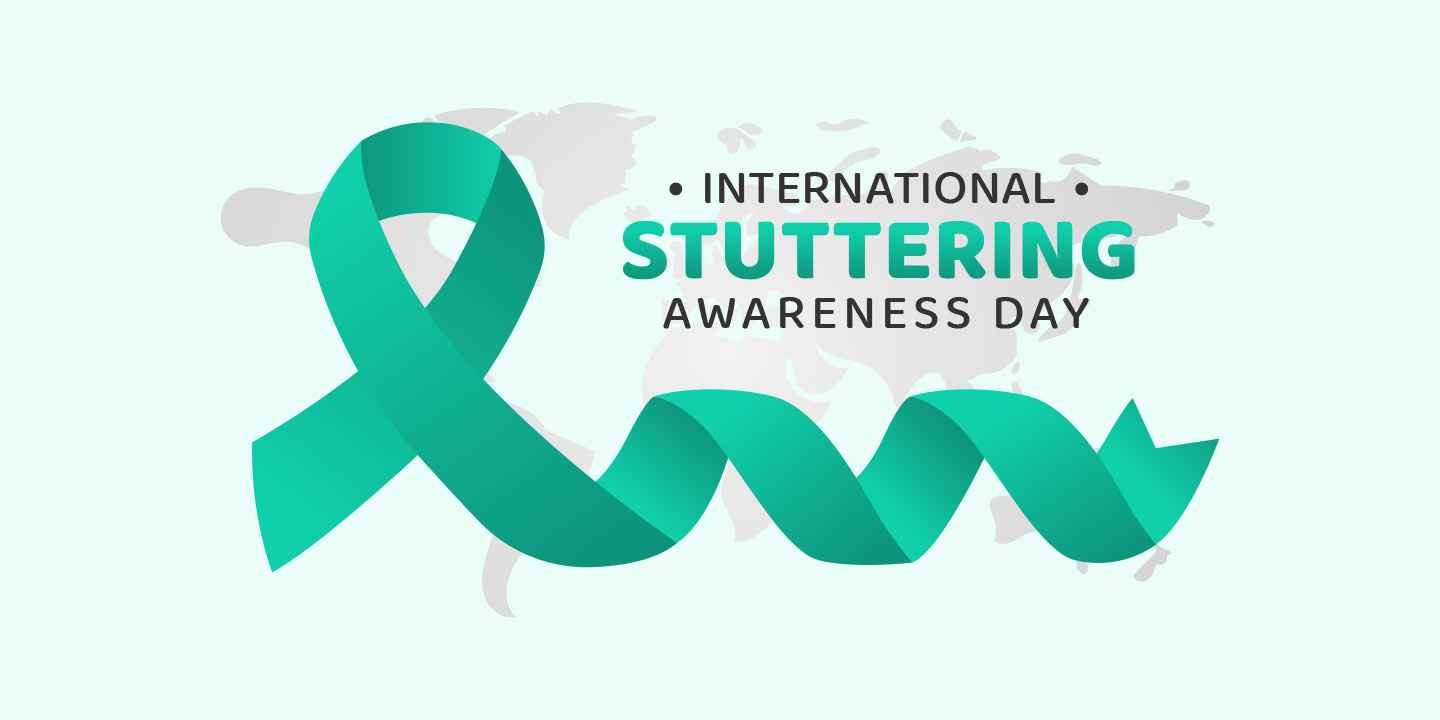International Stammering / Stuttering Awareness Day 2022

Medically Reviewed By
Dr Divya Rohra
Written By Prekshi Garg
on Oct 22, 2022
Last Edit Made By Prekshi Garg
on Jan 11, 2025

October 22 is recognised as International Stuttering Awareness Day every year to spread awareness about this common communication disorder. Stuttering, more commonly known as stammering, is a very common disorder in India. Around 11 to 12 million people are estimated to stammer in India. Stuttering is more common in children than in adults. Out of all the diagnosed cases of stammering in India, around 5% of cases are of children whereas only 1% of cases are diagnosed in the adult population.
With such high cases of stammering prevalent across the country, it is important that we learn more about International Stammering Awareness Day along with the causes, symptoms, diagnosis, and treatment of stuttering as well.
What is stuttering?
Stuttering occurs in several forms and does not only indicate the repetition of a specific word. Stuttering or stammering refers to a speech problem that interferes with the normal or natural flow of speech. Some essential features of stammering in people include speaking certain words or phrases again and again uncontrollably, having unnecessarily prolonged pauses in between the words, and having an abnormal rhythm of speech. Stammering generally occurs during the early childhood days, however, the condition may arise anytime in the later stages of life as well. Stuttering worsens during certain expressions like when you are tired, excited, under stress, pressurized, in a hurry, or self-conscious. It can be difficult for such people to talk on the phone or speak in front of a group. However, if the infected people sing or speak in unison with other people, they may not stutter at all. The severity of stuttering is inconsistent, that is, sometimes you may stammer more as compared to the other days where you stammer for some time only.
Some other speech problems related to stammering are foreign accent syndrome (FAS) and apraxia of speech. Foreign accent syndrome is a condition that leads to a sudden change in speech wherein a native speaker tries to speak in a foreign language. Apraxia of speech refers to an uncommon speech problem wherein the child has difficulty making accurate movements while speaking.
What are the important timelines related to International stuttering day?
The international stuttering day is recognized every year on 22nd October. There are certain highlights of the celebration of the stuttering day worldwide.
- In 1941, Phyllis Moir mentioned in her book that Winston Churchill grew up with a stutter.
- In 1947, the Stuttering Foundation of America was founded by Malcom Fraser.
- In 2010, film “The KIng’s Speech” released wherein it was depicted that King George VI took speech therapy from an Australian actor for years to overcome his problem of stuttering and gain confidence while he speaks publicly.
- In 2015, the British government took the decision of supporting the troops with neurological conditions with the help of the Defence Stammering Network.
How should international stuttering awareness day be celebrated?
The international stuttering awareness day is celebrated to spread knowledge among the people about this speech condition. Certain ways in which you can celebrate this day are:
- Get educated: There is a lot of social stigmas related to stuttering, so get yourself educated about what is stuttering, why it is caused, and how it can be diagnosed or treated.
- Attend virtual conference: The International Stuttering Association conducts an online conference on stuttering where participation is free. This is done so that international stuttering awareness day can reach every house.
- Get involved: Involve yourself in the celebration of the stuttering day by educating people around you who stutter and helping them in building confidence when they speak in front of the public.
What are the most common myths about stuttering?
With the advancement in social media and information systems available to each individual, a lot of myths and rumors have arisen regarding stuttering. Therefore, what better day to burst the myths about stuttering than the international stammering awareness day.
Myth 1
Nervousness leads to stammering.
Often stammering looks like the person has fallen out of words but this does not specifically mean that getting nervous is the main cause of stammering. The best way to deal with this condition is to tell the person to take a deep breath and wait patiently until the person completes his sentence. Do not cut that person in between.
Myth 2
Shyness leads to stammering.
Shyness is not the underlying cause of stammering. Shyness can make you speak less but does not cause you to stutter. People who stutter are often afraid of getting judged. Therefore, give them an equal amount of attention and show them that you trust them.
Myth 3
stuttering is just a habit.
People are often of the view that stuttering is a habit. But this is not true. stuttering is a neurological condition that can be easily treated by speech therapy classes. These classes do not promise to treat the condition but build your confidence while you speak.
Myth 4
People who stutter lack intelligence.
This is a completely absurd rumor. There are a lot of smart people across the world who stutter. stuttering is related to an area of your brain which is not involved in the intelligence of a person.
Myth 5
Stuttering is caused due to bad parenting.
Bad parenting is not the root cause of stuttering, however, it can worsen the condition that already exists.
Stuttering is a communication problem that prevents the affected person from talking in a continuous flow and it can also lead to problems in conveying their thoughts appropriately in a public gathering. This can cause embarrassment and also lead to a decrease in the self-confidence of the child and adults. The condition can hamper the personality development of the child and even deteriorate their quality of life. Thus, it is essentially important that people are made aware of the condition so that they know the symptoms, diagnosis, and treatment of the condition. This will help in the early diagnosis of the condition which facilitates early treatment and provides a better life for the affected person.
What are the causes of stammering?
Stuttering can be caused due to several factors. The exact cause of why you have the condition is diagnosed after a thorough mental and physical evaluation. Following are some of the most common causes that can lead to stuttering.
- Family history: If there is someone in your family that has the problem of stammering, then you have a greater chance of stammering. Providing the correct treatment in the early childhood days can help cure stammering that runs in your family.
- Stuttering can also be caused due to developmental or growth-related issues in the language and speech abilities of an individual.
- Neurophysiology: There are certain speech-related control areas in your brain that influence the signals between your brain and vocal muscles. Neurophysiology is generally the cause of stuttering in children, however, adults who have been through a severe psychological trauma or stroke can also stammer due to neurophysiology.
What are the symptoms of stuttering?
Whether or not you or your loved ones are stammering is clearly evident from the signs and symptoms. Following are some of the most common symptoms of stammering.
- Prolonging a sound or a word within a word
- Having difficulty initiating a sentence, phrase, or even a word
- Speaking broken words, that is, having pauses within a word
- Having a brief silence for some words or syllables
- Repeating certain words, syllables, or sound
- Exerting excessive tension, movement, or tightness of the upper body or only the face while speaking a word
- Adding an extra word like “umm” if having difficulty in moving from one word to the next.
- Having anxiety when you need to talk to people
- Having the limited ability to communicate or speak effectively
- The speech difficulties may be accompanied by other symptoms like tremors of the jaw or lip, rapid blinking of eyes, head jerks, facial tics, and clenching fists.
When should you consult a speech-language pathologist?
It's not that you need to visit a speech-language pathologist immediately when you observe your child stammering. This Is because children between the ages of 2 and 5 often stammer as a part of their learning to speak. However, this gets better on its own with time. So now the common question that arises is, when is the correct time when you should actually consult a professional for the stammering issue of your child? Well, there are certain conditions in which you should consult a speech-language pathologist to know whether or not your child has a stammering issue and how it can be treated. These conditions include:
- When stuttering occurs along with some other speech or language problem.
- When stuttering lasts for more than 6 months
- When stuttering occurs along with muscle tightening
- When you observe that your child is struggling while speaking
- If the stuttering becomes more frequent and continues when the child grows older
- If stuttering arouses anxiety or emotional problems in your child, that is, they tend to avoid or fear in situations where they need to speak.
- If stuttering affects the ability of your child to communicate effectively in social interactions like school or workplace
- If stuttering begins when you reach the adult stage
Takeaway
Stuttering or stammering is a very common speech condition that occurs in people. stuttering is common in children but when it exists for a greater time, it does need medical attention. International stuttering/stammering day is celebrated on 22nd October across the world to spread awareness about this common but less talked about speech disorder. Getting the right treatment at the right time can treat stuttering easily, therefore, it is very important that you know about this condition, its symptoms, and when you need to consult a doctor for this situation. Now that you know about stuttering, why it is caused, its symptoms, when to consult a doctor, and the myths about stuttering, you will better be able to analyze whether or not people around you suffer from any such medical condition.
Frequently Asked Questions (FAQs)
- Is there a cure for stuttering?
Stuttering cannot be treated completely. However, the speech therapy classes can help you build confidence and overcome stammering while speaking to a very great extent.
- Is stuttering a mental disorder?
Stuttering is a neurological disorder, however, it does not affect the intelligence of the infected person.
- Are stammering and stuttering two different things?
No, stammering and stuttering are two different words that indicate the same speech disorder.



